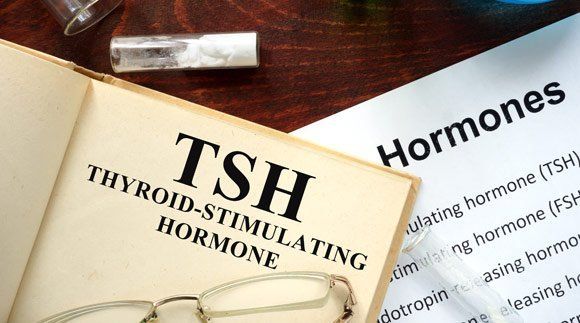Thyroid Deficiency & Adrenal Fatigue
Are you running on empty?
Feeling tired? Mentally dull? Perhaps a little constipated? Difficulty sleeping? Depressed? Are you cold when everyone else is warm? Are you anxious or having panic attacks? Gaining weight? Losing your hair? Have dry skin? Brittle nails? Is your blood pressure too low? Slightly high cholesterol? Do your joints ache? Have you lost interest in sex?
If any of this sounds like you, you may have adrenal fatigue or be suffering from thyroid deficiency syndrome. Thyroid deficiency syndrome means that your thyroid gland, which sits like a bow tie around the front of your neck, just below the Adam's apple, is churning out less thyroid hormone than the body needs. Normally the thyroid combines two tyrosine molecules, each with two atoms of iodine to produce thyroxine, also known as T4. When functioning properly the body converts T4 to T3 (tri-iodothyronin) and RT3 (reverse T3). T3 is the major active thyroid hormone; it turns on the ATP (energy) making machinery inside each body cell while the RT3 slows it down.
If any of this sounds like you, you may have adrenal fatigue or be suffering from thyroid deficiency syndrome. Thyroid deficiency syndrome means that your thyroid gland, which sits like a bow tie around the front of your neck, just below the Adam's apple, is churning out less thyroid hormone than the body needs. Normally the thyroid combines two tyrosine molecules, each with two atoms of iodine to produce thyroxine, also known as T4. When functioning properly the body converts T4 to T3 (tri-iodothyronin) and RT3 (reverse T3). T3 is the major active thyroid hormone; it turns on the ATP (energy) making machinery inside each body cell while the RT3 slows it down.

The Adrenal - Thyroid Link
The adrenal glands are a pair of small glands located atop each kidney. These glands, and the hormones they release, allow us to be resilient to day-to-day stress. When we are exposed to persistent or severe emotional or physical stress the adrenal glands may be pushed beyond their capacity to produce stress coping hormones e.g. cortisol. This can result in adrenal fatigue.
In the early stages of adrenal fatigue cortisol levels become chronically raised, this has a negative impact upon thyroid function since cortisol is directly antagonistic to thyroid. Cortisol reduces thyroid activity by reducing output of Thyroid Stimulating Hormone (TSH) from the pituitary. It also acts to stop the conversion of the thyroid hormone T4 (thyroxine) into the active form, T3 and by increasing production of RT3. This may be the body's way of conserving energy by reducing thyroid activity and thus slowing down metabolism.
In the early stages of adrenal fatigue cortisol levels become chronically raised, this has a negative impact upon thyroid function since cortisol is directly antagonistic to thyroid. Cortisol reduces thyroid activity by reducing output of Thyroid Stimulating Hormone (TSH) from the pituitary. It also acts to stop the conversion of the thyroid hormone T4 (thyroxine) into the active form, T3 and by increasing production of RT3. This may be the body's way of conserving energy by reducing thyroid activity and thus slowing down metabolism.
How Can You Test For Thyroid Deficiency?
Doctors typically base diagnosis for thyroid disease on the “normal” range of thyroid stimulating hormone (TSH). This assumes that if TSH is high the body has detected a need for more thyroid hormone to be produced. The range is between 0.5 and 5.0 mIU/L, however natural health practitioners see many patients slipping through the cracks in the medical system and use a more narrow range of 1.8 and 2.2.
As mentioned above if the adrenal glands are negatively influencing the thyroid gland TSH may fall to between 0.5 and 1.50, T3 may be reduced and RT3 may be raised. Doctors do not routinely test T3 or RT3 and they often do not test for thyroid antibodies. Many patients are diagnosed with an auto-immune disease known as Hashimoto’s Thyroiditis in the absence of any antibody testing to confirm it. Many people are therefore prescribed thyroid hormone replacement therapy for the rest of their lives when they may have had nutritional deficiencies which could have been addressed. Deficiencies to be considered include Selenium, Zinc, Vitamin A, Vitamin B2, Vitamin B12, Vitamin C, Vitamin D, Magnesium, Iron and Iodine.
Another way of testing is to take your basal body temperature at least four and up to ten mornings in a row before getting out of bed. This must be done with a glass thermometer placed under the tongue for 10 minutes. A lower than normal average temperature, below 36.6C would indicate an under active thyroid. If the temperature is consistently over 37C it may indicate hyperthyroidism. In menstruating women, on day 1 of the cycle on the first day of menstruation, the temperature will be at a lower level, during ovulation the temperature rises and remains at this higher level until dropping just before the next period. The best time to test is from day 2 or 3 of menstruation and over the next 10 days up to the next ovulation.
Another way of testing is to take your basal body temperature at least four and up to ten mornings in a row before getting out of bed. This must be done with a glass thermometer placed under the tongue for 10 minutes. A lower than normal average temperature, below 36.6C would indicate an under active thyroid. If the temperature is consistently over 37C it may indicate hyperthyroidism. In menstruating women, on day 1 of the cycle on the first day of menstruation, the temperature will be at a lower level, during ovulation the temperature rises and remains at this higher level until dropping just before the next period. The best time to test is from day 2 or 3 of menstruation and over the next 10 days up to the next ovulation.

Another good time to take your oral temperature is between 11 am and 3 pm. Do this 20 minutes after lunch which is when your thyroid function should be at its best and temperature ideally 37C.
The patient must also be assessed for signs and symptoms to gain a true perspective of their condition. Thyroid hormone helps regulate virtually every cell in the body. Among its most important functions in our cells is to control the rate of metabolism. If cellular metabolism drops too low, the result is widespread dysfunction that can manifest in a variety of ways. The signs and symptoms include fatigue, lack of energy, cold hands and feet, intolerance to cold, severe constipation, heavy menstrual periods, weight gain, diminished appetite, mental dullness, frequent infections, ringing in the ears, dizziness, loss of libido, headaches, insomnia, anxiety and depression. Symptoms worsen with time; the pulse slows, the skin becomes cool, dry and coarse, muscles ache, there is puffiness around the eyes, hair falls out, the voice becomes hoarse and the reflexes are sluggish. Changes in mood and personality simulating psychiatric illness may occur. The thyroid gland may enlarge, producing a goitre. It is important to note that not all of these symptoms need to be present.
Symptoms of Adrenal Fatigue
As pointed out earlier adrenal fatigue can cause the thyroid to become sluggish; many symptoms of adrenal fatigue overlap with thyroid deficiency.
- Morning fatigue. You don’t really wake up until 10 a.m., even if you’ve been up since 7 a.m.
- Afternoon “low” (feelings of sleepiness or clouded thinking) from 2 to 4 p.m.
- A burst of energy at 6 p.m. when you finally feel better from your afternoon lull
- Sleepiness around 9p.m. to 10 p.m. However, you resist going to sleep
- A “second wind” at 11 p.m. that lasts until about 1 a.m., when you finally do go to sleep
- Cravings for foods high in salt and fats
- Chronic low blood pressure
- Sensitivity to cold and feeling chilled
- Increased PMS or menopausal symptoms
- Mild depression
- Mood swings
- Mental fog
- Memory problems
- Lack of energy and feeling rundown
- A decreased ability to handle stress
- A decreased ability to recover from illness
- Muscular weakness
- Increased food allergies
- Light-headedness when getting up from a sitting or lying down position
- Decreased sex drive
- Frequent sighing
- Inability to handle foods high in potassium or carbohydrates unless they’re combined with fats and protein
- You crave sugar

What Can Natural Medicine Offer You?
If you have an underactive thyroid with no antibodies present normal function may be returned with herbal and nutritional supplements.
If you have an underactive thyroid with antibodies present herbal and nutritional medicine may reduce the antibody levels and normal function may be returned.
If you have either of the above situations and are currently taking thyroid replacement therapy but feel it is not working as well as expected herbal and nutritional medicine may improve how your body responds to it.
If you have an overactive thyroid and need to use the prescription medication to reduce thyroid hormone, nutritional and herbal medicine may reduce the duration of treatment and the dose needed for efficacy.
If you suspect you have adrenal fatigue herbal and nutritional medicine should have you feeling much better in a few weeks.
If you have a thyroid disorder or suspect you have adrenal fatigue consider making an appointment with Linda Lowen, one of the best Naturopaths Adelaide at the Highbury Natural Health Centre. Phone 8395 2836
If you have an underactive thyroid with antibodies present herbal and nutritional medicine may reduce the antibody levels and normal function may be returned.
If you have either of the above situations and are currently taking thyroid replacement therapy but feel it is not working as well as expected herbal and nutritional medicine may improve how your body responds to it.
If you have an overactive thyroid and need to use the prescription medication to reduce thyroid hormone, nutritional and herbal medicine may reduce the duration of treatment and the dose needed for efficacy.
If you suspect you have adrenal fatigue herbal and nutritional medicine should have you feeling much better in a few weeks.
If you have a thyroid disorder or suspect you have adrenal fatigue consider making an appointment with Linda Lowen, one of the best Naturopaths Adelaide at the Highbury Natural Health Centre. Phone 8395 2836